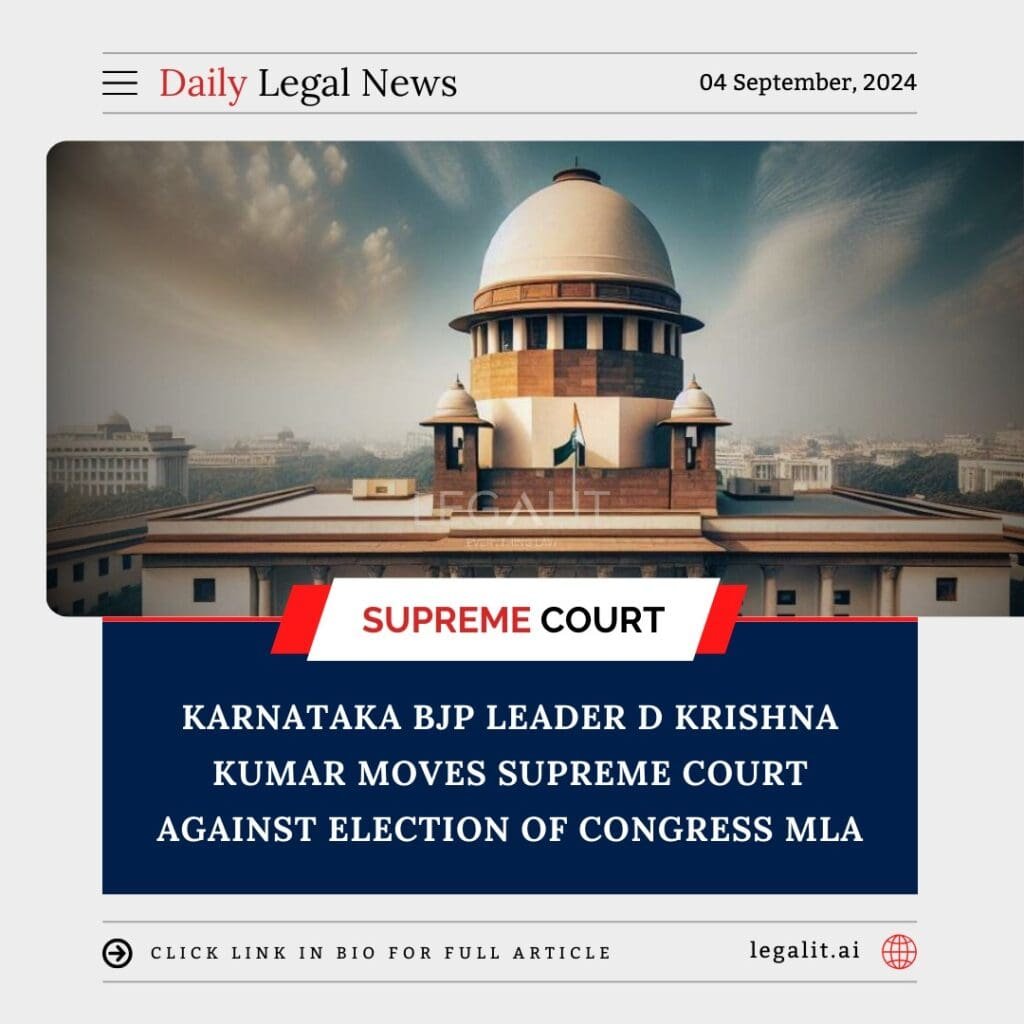
D Krishna Kumar, a prominent leader from the Bharatiya Janata Party (BJP) in Karnataka, has approached the Supreme Court challenging the election of a Congress MLA. This legal move stems from allegations of electoral malpractice and procedural irregularities that, according to Kumar, affected the integrity of the election process.
Background of the Case:
The challenge pertains to the recent Karnataka state assembly elections, where a Congress candidate was declared the winner in a closely contested constituency. D Krishna Kumar, who was the BJP candidate in the same constituency, has raised concerns over the conduct of the elections, alleging discrepancies that may have altered the outcome.
Key Grounds for the Petition:
- Allegations of Electoral Malpractice: Kumar’s petition claims that the Congress MLA’s election was marred by various forms of electoral malpractice, including violations of the Model Code of Conduct, undue influence, and voter intimidation. The petition alleges that these irregularities had a significant impact on the fairness and transparency of the election.
- Improper Voter List Management: Another key point in the petition is the claim that there were discrepancies in the voter list management. Kumar argues that numerous genuine voters were either removed or had their names improperly listed, while unauthorized or ineligible voters were allowed to cast their ballots. He contends that such irregularities directly affected the electoral results.
- Violation of Election Commission Guidelines: The petition also highlights alleged violations of Election Commission guidelines, particularly concerning the handling of Electronic Voting Machines (EVMs) and the Voter Verifiable Paper Audit Trail (VVPAT) system. Kumar claims that the lack of proper safeguards in the management and handling of these devices raises questions about the validity of the election outcome.
- Request for Annulment and Re-Election: Based on these grounds, Kumar is requesting the Supreme Court to annul the election of the Congress MLA and order a re-election in the affected constituency. He argues that a fresh and fair election is necessary to uphold the democratic process and ensure that the true will of the people is reflected.
Possible Implications of the Case:
- Impact on Legislative Dynamics: If the Supreme Court accepts Kumar’s petition and orders a re-election, it could impact the legislative dynamics in Karnataka, where the balance of power between parties is often closely contested. A re-election could either reaffirm the Congress’s win or shift the seat to the BJP, affecting the overall party standings in the state assembly.
- Precedent for Electoral Integrity: The case could set an important precedent regarding electoral integrity and the standards required for free and fair elections. A decision in favor of Kumar might prompt stricter enforcement of election guidelines and reforms to address potential loopholes or weaknesses in the electoral process.
- Scrutiny of Election Conduct: The petition brings additional scrutiny to the conduct of elections in Karnataka and potentially across India. The Supreme Court’s involvement could lead to a broader review of electoral practices, including the management of voter lists, adherence to the Model Code of Conduct, and the handling of EVMs and VVPAT systems.
- Legal and Political Ramifications: A decision on the petition could have both legal and political ramifications. A favorable ruling for Kumar could empower other candidates and political parties to challenge electoral outcomes they consider unfair, potentially increasing litigation over election results. It could also bolster the BJP’s position in Karnataka by challenging the legitimacy of Congress’s victory.
Conclusion:
D Krishna Kumar’s move to challenge the election of a Congress MLA in the Supreme Court is a significant development in Karnataka’s political landscape. The petition raises fundamental questions about electoral integrity, transparency, and fairness. As the Supreme Court considers the case, its decision could have far-reaching consequences for future elections and democratic governance in the state and beyond.